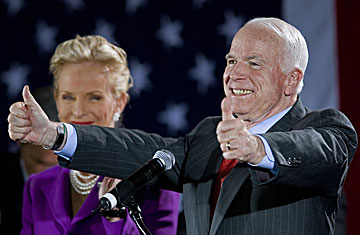
John McCain addresses his supporters after winning the South Carolina primary, January 19, 2008.
The night before the South Carolina primary, the only optimist aboard John McCain's Straight Talk Express was state chairman Sen. Lindsey Graham. "I feel as good about this election," said Graham, "as I've ever felt about any election before." McCain — who was famously burned in South Carolina in 2000 after his New Hampshire victory, when a whisper campaign and George Bush's dominance of the state's Republican party structure combined to deliver a crushing blow — was openly nervous. He even asked his staff to switch his exit song at rallies from confident, macho stuff like the Rocky theme to something that would make a softer, humbler appeal to voters. Thus the confluence of John McCain and ABBA's Take A Chance on Me.
Now, the morning after he beat back Mike Huckabee in what was viewed as a state the former Arkansas governor had to win, John McCain is the only Republican candidate to have racked up victories in two major primary contests — and the winner in a state that has endorsed the eventual nominee in every election cycle since 1980. "A South Carolina victory is an enormous victory," says senior advisor Steve Schmidt.
Since the beginning of the year, McCain and Huckabee were the only real contenders in the state. McCain took 33% of the vote to Huckabee's 30%, winning by a margin of roughly 13,000 votes. What appears to have put McCain over the top was an assist from his friend and distant third — place finisher Fred Thompson, who may have siphoned off some of Huckabee's evangelical support in conservative counties. Otherwise, exit polling showed McCain and Huckabee in a dead heat for the heart of the GOP, with roughly the same amount of support from those with a positive view of the Bush administration, those without a college education and self — identified Republicans.
Still, tight as it was, the outcome is yet another rebuke to those that pronounced the McCain campaign dead last summer after a staff shake — up and budget crisis. But in an unprecedented election cycle, the question remains: is coming back from the dead enough?
The answer may well come further south, in Florida, when the state holds its primary on Jan. 29 and the race for the nomination will essentially be reset. "McCain comes into this thing with momentum, but so does Mitt Romney," says unaligned Republican pollster Neil Newhouse. (Romney won Saturday's largely uncontested Nevada caucus.) "And Rudy Giuliani is waiting down there with a welcome sign. It's the only state where all four of the leading candidates have a shot to win this thing."
Polls show the Florida race split almost evenly among the three candidates who have won a major primary or caucus and Giuliani, whose campaign strategy was prefaced on ignoring the early states and betting big on Florida. "It's a microcosm of the nation in many ways," says Newhouse. "It's southern, with an extensive northern population. There's a substantial population of establishment Republicans, a substantial population of evangelical Republicans. If [a candidate] can win Florida, they can probably win the nomination."
In Florida, McCain will have to defend his precarious frontrunner standing on several fronts. He must argue that despite his decades in Washington, he is an agent of change. He must convince voters increasingly worried about the economy that Romney's private sector success is not as important as his record of government experience. (And Fred Thompson may not hang in long enough to be spoiler among conservative Florida Republicans.) Even more dramatically, McCain must make the case to moderates and independents that he, not Giuliani, best represents their interests. "My guess is that we'll split the moderates with Giuliani," concedes McCain adviser Charlie Black. "But we're gonna win a lot of conservatives. We beat Romney with conservatives here and we'll certainly beat him with conservatives in Florida."
That's the kind of confidence that was hard to find the night before South Carolina, but with a key win behind them, the McCain campaign seems to have it's inner Rocky back. "They keep giving us reasons why John Mccain can't win a primary," says Schmidt, "and he keeps winning primaries."
